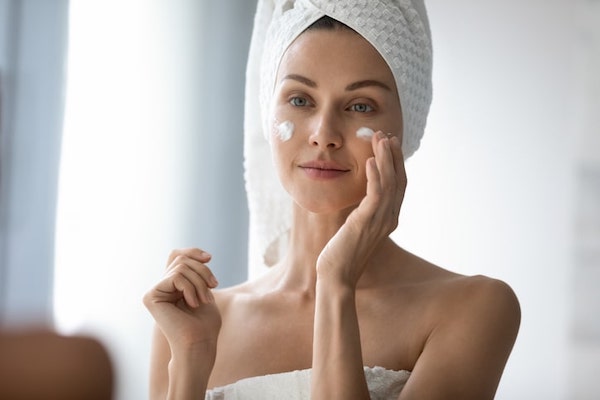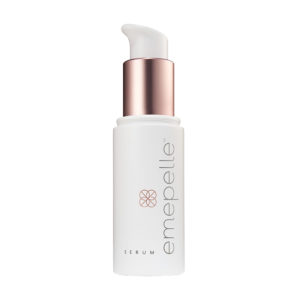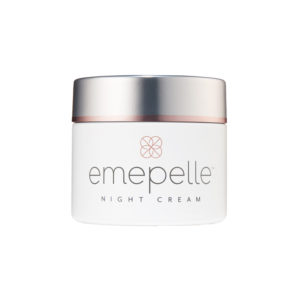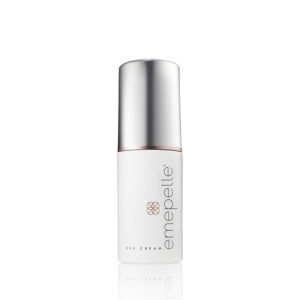If you’re shopping for skincare products, you’ve probably come across many mentions of collagen. Collagen is a protein found in your body that promotes strong bones, healthy joints and skin elasticity. As you age, your body naturally produces less and less collagen. This can be a contributing factor to dry skin and wrinkles.
The benefits of collagen are widely touted in skincare —but the relationship collagen and estrogen often goes unmentioned. In reality, women’s production of collagen is closely tied to their estrogen levels. Discover the relationship between collagen and estrogen, and how it affects your skin over time.
How Is Estrogen Connected to Collagen?
What does estrogen have to do with your collagen production? Studies have shown that estrogen supports collagen production by binding to receptors in the skin known as fibroblasts.
Fibroblasts are responsible for producing collagen—the protein which gives skin its strength and flexibility—and elastin—the protein which allows stretched skin to return to its original shape. While both collagen and elastin play a role in skin elasticity, collagen is perhaps the most critical, making up roughly 70-80% of the weight of your skin.
Collagen production throughout your life does not precisely mirror the rise and fall of estrogen levels, but the two are certainly correlated. Since estrogen is a key component in activating fibroblasts, high levels of estrogen are linked to high collagen production. As your estrogen levels drop (for example, when you go through menopause), your collagen production decreases along with it.
How Do Collagen and Estrogen Levels Change Over Time?
Just as your estrogen levels naturally change over the course of your life, so do your collagen levels. Collagen and estrogen typically peak in your late-20s or early-30s. During perimenopause, your estrogen levels will begin to fall. The closer you get to menopause—which is marked by going one year without a period—the more dramatic the estrogen decrease becomes. As a response, there is a dramatic loss of collagen that naturally occurs around this time as well.
Here’s an overview of how collagen changes over the course of a woman’s life:
- Women in their late-20s or early-30s tend to lose collagen at a rate of about 1% each year, as the fibroblasts in the skin become less active
- In the first five years following menopause, women lose a staggering 30% of their skin’s collagen
- Postmenopausal women continue to lose about 2% of their skin’s collagen content each year thereafter
Skincare Concerns Associated With Low Collagen and Estrogen
Although collagen is found throughout your entire body, the effects of collagen are most visible in the face. This is because your face has a greater number of estrogen receptors than other parts of your body. Women with high collagen production may notice that their skin looks plump and youthful. However, women with low collagen production may experience concerns such as:
- Dry skin
- Thinner skin
- Decreased elasticity
- Wrinkles
Women may assume that changes in their appearance are just a natural part of the aging process, without realizing that these skincare concerns are often directly linked with menopause. In fact, the collagen loss that occurs as women approach menopause is one of the most dramatic forms of intrinsic skin aging.
Estrogen Deficient Skin
Estrogen Deficient Skin is a condition characterized by changes in the skin accompanied by declining estrogen levels. Women with Estrogen Deficient Skin may notice their skin becoming dryer, duller and more fragile. They may also notice visible wrinkles or crepey skin.
If you’re experiencing sudden onset changes in your skin’s appearance, it’s important to ask yourself if estrogen deficiency and collagen loss may be the cause. This can help you determine what types of products will be most effective for treating your concerns.
Promoting Collagen Production Through Skincare
Estrogen and collagen naturally decrease as we age—but that doesn’t mean you should resign to being unhappy with the way your skin looks. Fortunately, there are skincare ingredients and products that are specifically designed to help address Estrogen Deficient Skin without the use of hormones.
For instance, MEP Technology is another breakthrough in treating Estrogen Deficient Skin. This ingredient, patented by Emepelle, works non-hormonally aiding estrogen receptors in the skin, to help stimulate the production of collagen and elastin. MEP is a unique, non-hormonal ingredient that acts only on the skin. Additionally, the more widely-known ingredient, retinol, helps promote collagen production and cellular turnover by stimulating the receptors that produce collagen.
Some products that can address concerns of collagen loss include:
- Emepelle Night Cream ($195): This luxurious, restorative cream features MEP Technology, retinol, niacinamide and peptides. It is been shown to improve firmness, hydration and luminosity for women in perimenopause and menopause.
- Emepelle Eye Cream ($98): Featuring MEP Technology, caffeine, vitamin E and peptides, this rejuvenating eye cream can help you reduce under-eye wrinkles and puffiness. Unlike other eye creams, it is specifically formulated for women experiencing estrogen loss in perimenopause and menopause.
- Retriderm Serum Mild ($84): Ideal for sensitive skin or those new to retinol, our Retriderm Serum Mild is a great way to reduce the appearance of fine lines and wrinkles while avoiding the irritation that can come with some retinol products.
Shop our full collection of skincare products for Estrogen Deficient Skin.




